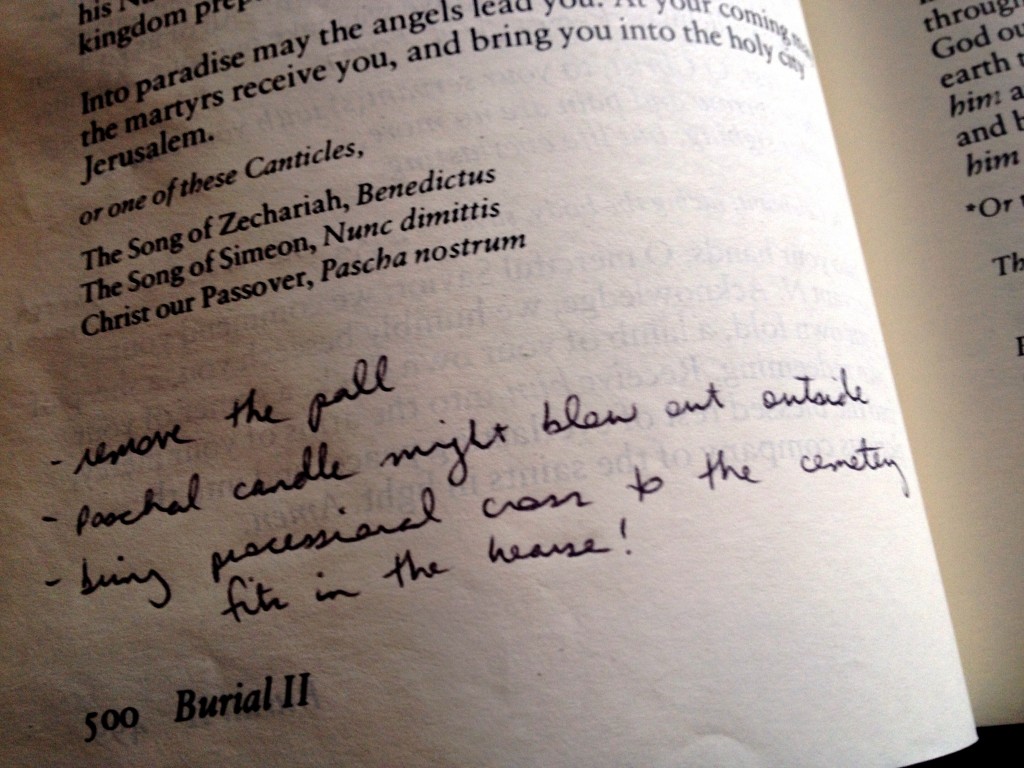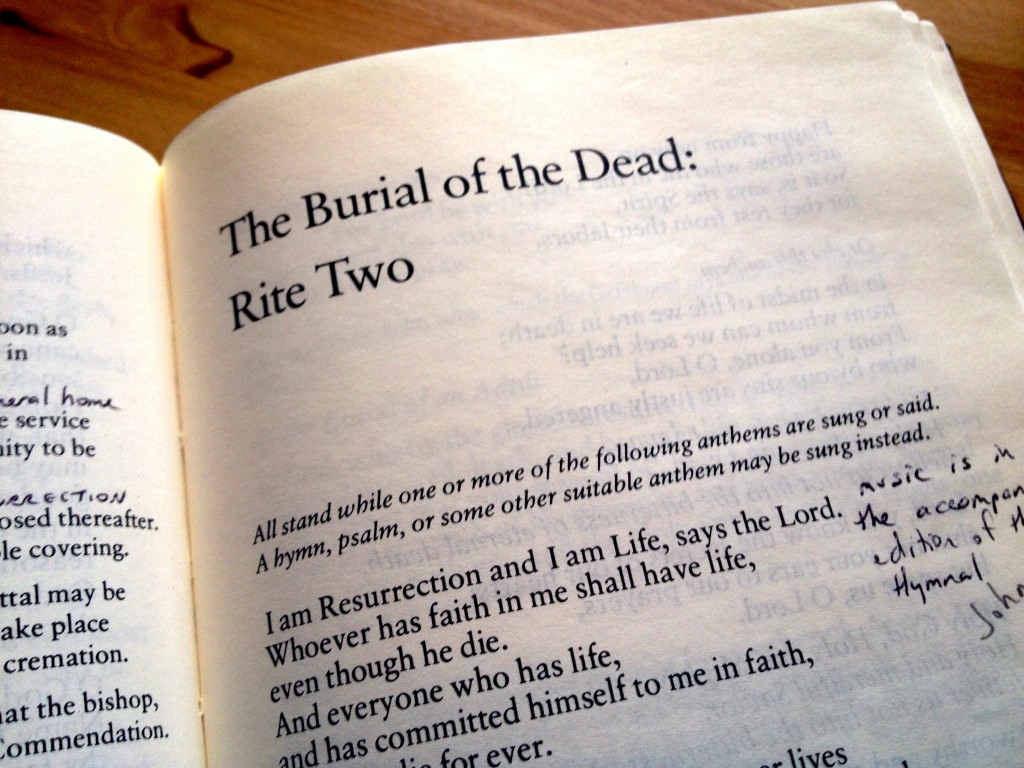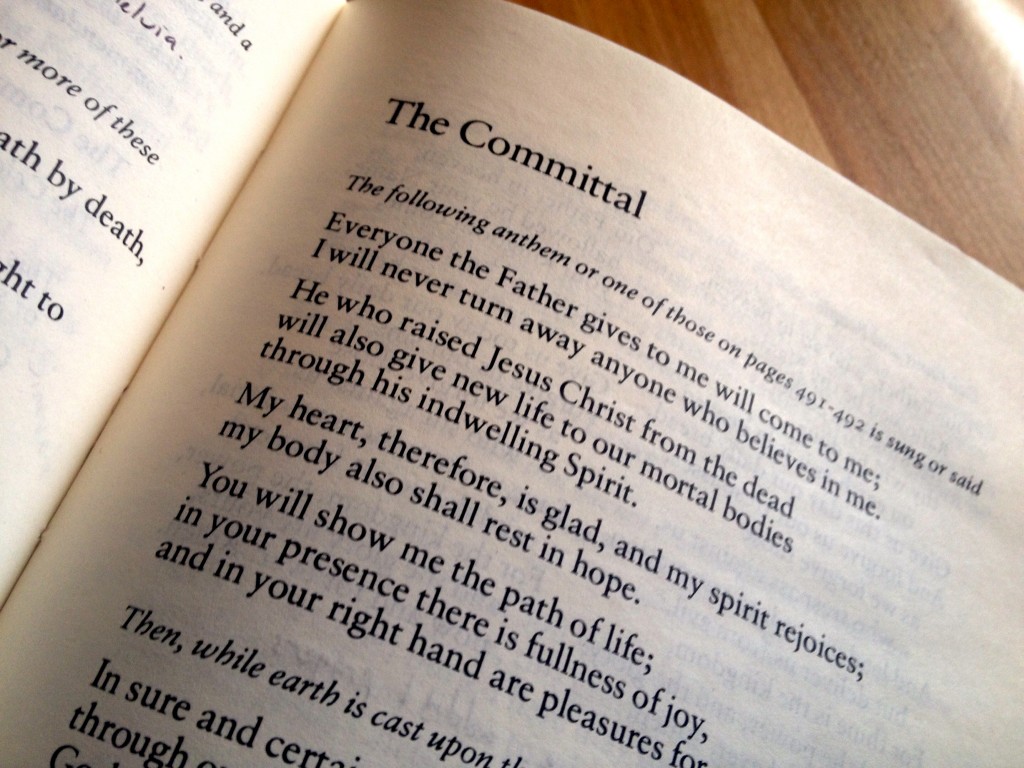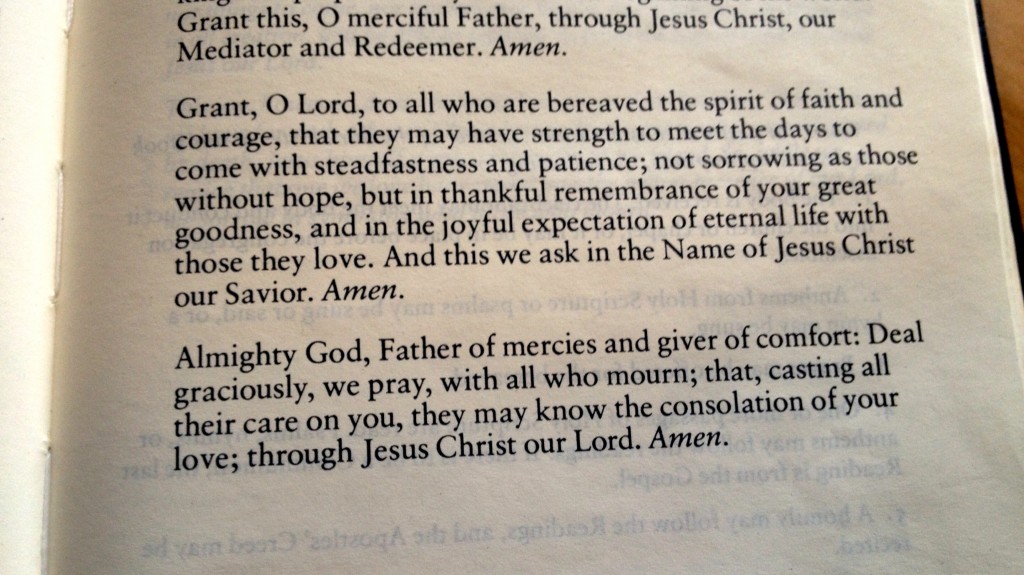Not many people die at my church (Lord, have mercy). Many members move away to warmer places in retirement. Most current members are in their 40s, 50s, and 60s, with few folks 80 and above. So, it’s taken me a while to really learn to do a funeral.
Usually, the story is that a young clergyperson starts at their first church and does three funerals the first week! Or ten the first month! I didn’t do my first funeral until my second year at St. Benedict. And I’ve only presided at seven funerals in my six and half years here: three in the church and four in funeral homes. Only two graveside services. (My husband, a pastor, did a third because of a doctor’s appointment I couldn’t reschedule.)
I came into ministry with a chip on my shoulder about funerals – and weddings. In seminary, I remember hearing cautions from professors and mentors about letting funeral directors and wedding coordinators encroach on “priest territory.” Don’t let them boss you around! Insist on what you need for the liturgy! You’re in charge! No secular music! No flash photography! No unity candles!
It didn’t take long before I learned to be grateful for wedding coordinators. It’s hard to believe that I once felt possessive about things like coaching the bridesmaid procession. I’m very happy to stand quietly with my book in the front of the church and let the coordinator do her thing. (Although once, when a coordinator directed the bridesmaids to stand in a lovely row in front of the podium, I did butt in.)
At the first funeral I did at a funeral home, I tried very much to be in charge and I felt strongly that the coffin should be closed. Because that’s what The Book of Common Prayer says (showing the Resurrection is more real than death). I talked to the funeral director about this and he said, “Well pastor, I think the family would very much like for the coffin to be open. But you can ask them.” When I did, they said yes, they wanted an open coffin during the service. Oh. Was I going to argue with the grieving family? Nope. (I’ve since learned that open coffins are very much the norm at funeral homes here.)
I did my seventh funeral last week and for the first time felt like I truly knew what I was doing. It’s not that all my previous funerals were disasters, but I hadn’t done the service enough to feel comfortable in my own skin standing at the front of them. Funerals are of one the most important things clergy do. We must never stop feeling awed and dumbstruck by the tragedy of death or the joy and glory of resurrection, but also calm enough to be present with clarity and flexibility so we can make the service meaningful and spacious for the grief of the friends and family who gather.
Weddings are planned for months and even years. Funerals are usually planned over just a few days, or maybe weeks. A wedding is usually a little frenetic, but joyful. Funerals are tender, slow, and full. A mentor of mine said: “You can mess up at a wedding. People will laugh and tell stories for years about something a pastor did wrong at a wedding. But you should do everything in your power not to mess up at a funeral.”
 In my liturgy class back in 2006, I made a note in my prayer book on the Burial II page: “bring processional cross to the cemetery – fits in the hearse!” Last week, because I wasn’t trying to remember so many other things, I remembered that note. I brought our processional cross to the funeral home and after the service I put it in the hearse alongside the coffin. At the cemetery, a parishioner served as acolyte, carrying the cross and leading me and the coffin to the gravesite, and he stood next to me as I led the service – the cross standing tall. I’m not sure anyone else noticed, but it felt like another small detail of attention and care that my congregation and I could bring to this family, proclaiming that God stands with us and that “Christ is risen from the dead, trampling down death by death, and giving life to those in the tomb.”
In my liturgy class back in 2006, I made a note in my prayer book on the Burial II page: “bring processional cross to the cemetery – fits in the hearse!” Last week, because I wasn’t trying to remember so many other things, I remembered that note. I brought our processional cross to the funeral home and after the service I put it in the hearse alongside the coffin. At the cemetery, a parishioner served as acolyte, carrying the cross and leading me and the coffin to the gravesite, and he stood next to me as I led the service – the cross standing tall. I’m not sure anyone else noticed, but it felt like another small detail of attention and care that my congregation and I could bring to this family, proclaiming that God stands with us and that “Christ is risen from the dead, trampling down death by death, and giving life to those in the tomb.”
A funeral isn’t something clergy should ever believe they’ve “mastered” – we should be more humble that that. But maybe it’s like learning to ride a bike: once you’ve learned the basics, you can focus on the journey and the people around you instead of worrying that you might fall off.






Thank you for this beautiful reflection. I’ve done a pretty equal number of funerals and weddings, and both contain sadness and happiness. I “like” funerals best; they contain the most joy, even the hardest ones. And now I’ll make a note about bringing the processional cross. What a meaningful symbol of our trust in God’s power!
Well VICAR, I’ve done about 800 funerals. Never did learn how to do them. All I can say is that I much prefer them to weddings. Save one thing: use a form that even every member can fill in regarding what they want: hymns, scripture, etc. Saved me a lot of time and arguments. Make the form as detailed as you like.
My wedding story from the late 1970s – the equal rights era: I had insisted that the married couple not be introduced as Mr and Mrs, instead use our first names. So, when we were announced, the words that rolled out were each of our first names and my maiden name, not his last name. The laughing carried everyone to the gathering and set the right tone for the reception. May my funeral be even more joyful!
I’ve done many more funerals than weddings and, though I enjoy both, I have discerned that I particularly appreciate doing funerals. It is an opportunity to engage in basic, really important ministry. Thank you for this wonderful reflection on burial ministry, in which we have the most acute opportunity to point to the power of the Resurrection, of life over death. Thank you for the suggestion to bring the processional cross to the cemetery too.
I attended Rev. Heidi’s most recent funeral & she did a great job – she was both solemn & celebratory – followed the Litergy in a solemn way & incorporated humor & joy into her Homily, so that we had a true celebration of the deceased’s life. I hope my funeral (in the distant future!) is as good!
I too have done more funerals than weddings and am always aware of how humble, and yet joyful, they make me feel. Heidi, your reflection is powerful – thank you (and for the processional cross idea too!). In fact, you were in my prayers because the person whose funeral you did was once a parishioner at St. Martin’s. If it’s the person I think, we’ve been praying for her and her family the last two weeks.
I am a new Pastor and training daily. Does anyone have a good training process on how to do funerals or weddings. I have never done either and would love to learn how of course through the grace of God.